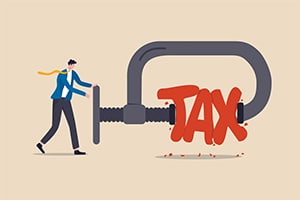
Business Advisory Services
Everything you need to help you launch your new business entity from business entity selection to multiple-entity business structures.
Hey - Our site just had a makeover and we are sorting through the hiccups!
Hey - Our site just had a makeover and we are sorting through the hiccups!

Everything you need to help you launch your new business entity from business entity selection to multiple-entity business structures.

Designed for rental property owners where WCG CPAs & Advisors supports you as your real estate CPA.

Everything you need from tax return preparation for your small business to your rental to your corporation is here.

Table Of Contents


Also, a quick recap- the SSTB designation only affects you if you earn more than $315,000 in taxable income as a household (married filers) or $157,500 (single filers). These are 2018 numbers, and are indexed to not-so-round numbers in future years.
Prior to the Tax Cuts and Jobs Act of 2017, personal service corporations (PSCs) were taxed at a flat rate of 35% while garden variety C corporations were taxed at a graduated rate. Why were PSCs disfavored if you will? No one really knows. Online research doesn’t readily show the genesis of this distinct tax schedule; perhaps a look into some Committee notes or the Joint Committee Bluebook would help. Historically it is just one of those things that has been around.
No one seemed to care much about the 35% (pre-TCJA) tax rate since an owner or set of owners could elect to be taxed as an S Corp and pass the tax obligation to each shareholder at his or her individual tax rate. Yes, the highest tax rate prior to TCJA was 39.6% so some thought that the 35% was a deal! However, to pull money out of a corporation (C Corp or PSC) required a dividend and as such that money was taxed at dividend tax rates in addition to the corporate tax rate. For a look at why C corporations are still a bad idea even with a 21% flat tax see our article here.

So there is a stigma out there that perhaps started with personal service corporations and was reinforced with Domestic Production Activities Tax Deduction (aka QDPA). QDPA came about with Section 199, without the A, and encouraged the manufacturing (stuff), growing (farming) or extraction (oil and gas) of tangible personal property. This is a huge simplification, but as you can see it did not encourage personal services.
Along comes Section 199A qualified business income deduction which grabs code from PSCs and qualified domestic production activities to provide a deduction for small business owners. Why the heck does Section 199A penalize specified service trades or businesses? Who knows exactly why, but perhaps there is some theory behind it.
Disguised W-2 Compensation
One of the theories is that many attorneys, physicians (especially), accountants, consultants and financial advisors can easily be converted into contractors. Personal service industries can easily follow the rules of contractor status and as such, many might want to convert from a W-2 relationship to a 1099 relationship to grab a Section 199A deduction. Perhaps discouraging a “disguised W-2” business-to-business relationship is one of the theories.
Economic Stimulus
Another theory is that encouraging non-SSTBs such as manufacturing results in a better stimulus to the economy since these businesses usually hire employees and buy buildings or offices. Conversely, the hot-shot surgeon or big-time attorney might be a one-person show. How does this effect things? A one-person show is the limiting factor on revenue and can only work so much. Think of it this way, a hot-shot surgeon doesn’t necessarily hire other surgeons to help out around the office, and as such isn’t stimulating the economy with hiring employees. But you take a manufacturer who is growing and needs employees, perhaps a tax break would help them grow faster and better, and add that much more to the economy.

Yeah, we are whining over sour grapes. Yes, this is our chosen profession and we could have picked manufacturing or some of other non-SSTB field.
We propose a simple solution to the SSTB problem. If your employee salaries exceed the officer compensation (shareholder salaries), then all bets are off; you are not a specified service trade or business and as such you are entitled to the full Section 199A deduction (again this is our suggestion- it is not law, yet). Specifically Line 8 would be greater than Line 7 on an S Corp tax return. Sure, you could always lie, cheat or steal on the business tax return to embed shareholder salaries into employee salaries… but those taxpayers who are inclined to do something like that are already gaming the system in another way.
A Specified Service Trade or Business includes professions like attorneys, physicians, accountants, consultants, and financial advisors.
Only if household taxable income exceeds the specified thresholds ($157,500 single, $315,000 married, 2018 numbers).
To potentially prevent disguised contractor arrangements and encourage economic growth via hiring businesses.
Historically, a PSC was taxed at a flat 35% rate and generally included service-based corporations.
Possibly, if employee salaries exceed shareholder salaries, the business may qualify for the full deduction, though this is not official law.
Not necessarily, but SSTB limitations are more likely to apply.
Only income from SSTB activities may be limited; non-service operations could qualify for the full deduction.
No, manipulating tax returns is illegal and can lead to IRS penalties.
It applies to many small businesses, but SSTB rules restrict some high-income personal service providers.

Want to talk to us about tax return preparation, tax planning and strategy, and all the other things that go with it? We are eager to assist! The button below takes you to our Getting Started webpage, but if you want to talk first, please give us a call at 719-387-9800 or schedule an discovery meeting.
Jason Watson, CPA is a Partner and the CEO of WCG CPAs & Advisors, a boutique consultation and tax preparation CPA firm serving clients nationwide with 7 partners and over 90 tax and accounting professionals specializing in small business owners and real estate investors located in Colorado Springs.
He is the author of Taxpayer’s Comprehensive Guide on LLC’s and S Corps and I Just Got a Rental, What Do I Do? which are available online and from mostly average retailers.
Table Of Contents

Tax planning season is here! Let's schedule a time to review tax reduction strategies and generate a mock tax return.

Tired of maintaining your own books? Seems like a chore to offload?
Did you want to chat about this? Do you have questions about us? Let’s chat!
The tax advisors, business consultants and rental property experts at WCG CPAs & Advisors are not salespeople; we are not putting lipstick on a pig expecting you to love it. Our job remains being professionally detached, giving you information and letting you decide within our ethical guidelines and your risk profiles.
We see far too many crazy schemes and half-baked ideas from attorneys and wealth managers. In some cases, they are good ideas. In most cases, all the entities, layering and mixed ownership is only the illusion of precision. As Chris Rock says, just because you can drive your car with your feet doesn’t make it a good idea. In other words, let’s not automatically convert “you can” into “you must.”
Let’s chat so you can be smart about it.
We typically schedule a 20-minute complimentary quick chat with one of our Partners or our amazing Senior Tax Professionals to determine if we are a good fit for each other, and how an engagement with our team looks. Tax returns only? Business advisory? Tax strategy and planning? Rental property support?

Everything you need to help you launch your new business entity from business entity selection to multiple-entity business structures.

Designed for rental property owners where WCG CPAs & Advisors supports you as your real estate CPA.

Everything you need from tax return preparation for your small business to your rental to your corporation is here.


